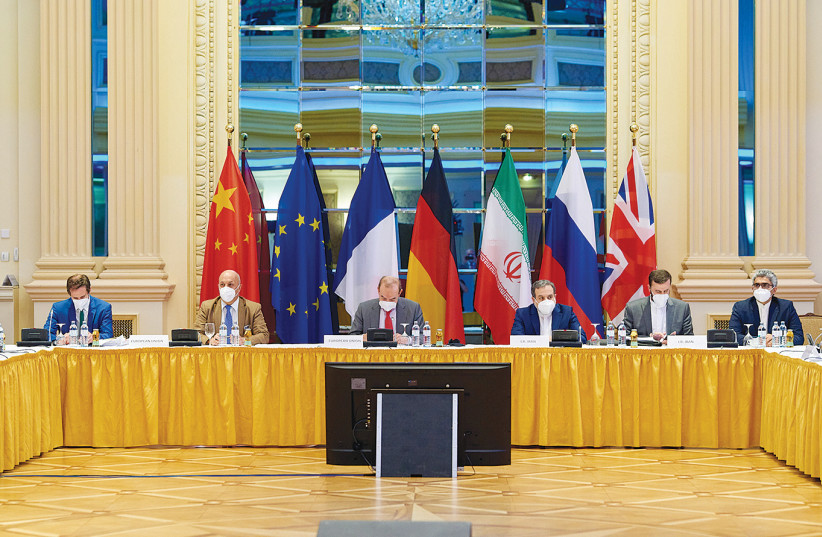As negotiations with Iran over a return to the 2015 nuclear deal are set to resume in Vienna on November 29, Washington’s point man on the issue – Robert Malley – was in Israel this week as part of a regional tour that also took him to Bahrain, the United Arab Emirates and Saudi Arabia.
While in Israel, he met with Defense Minister Benny Gantz and Foreign Minister Yair Lapid, though Walla reported that Lapid reportedly was not going to meet with him at first, and agreed only after his political rival Gantz did so. He also met with Mossad head David Barnea and National Security Council chief Eyal Haluta. He did not meet with Prime Minister Naftali Bennett.
This schedule of meetings – yes with Gantz, no with Bennett, no then yes with Lapid – speaks of a government not quite sure how to deal with an American administration obviously keen on restoring the nuclear deal with Iran.
There are essentially two approaches when dealing with such an administration. The first is the one that was adopted by former prime minister Benjamin Netanyahu: Don’t engage with the Americans over the deal so as not to be seen as legitimizing it, thereby retaining the freedom to publicly criticize and actively oppose it.
In the run-up to the conclusion of the Iranian nuclear deal in 2015, formally known as the JCPOA, Netanyahu prohibited Israeli security and intelligence officials from having concrete discussions with the Obama administration over the deal.

According to this school of thought, if the US makes up its mind to enter a deal, it is going to do so, and Israel will neither be able to move it off this course nor influence the outcome from the inside.
What the Americans, in this scenario, want from Israel is industrial quiet, minimal pushback and limited noise. Why? Because if Israel publicly and loudly opposes a deal, as Netanyahu did – even delivering an address in 2015 to a joint session of Congress warning against one – that both creates and galvanizes internal opposition to the deal inside the US.
Engaging in a constructive dialogue with the US over the terms of the deal brings Jerusalem into the process. Then, when Republican and even some Democratic lawmakers oppose the deal, an administration actively talking with Israel about the terms and how to make it “longer and stronger” can turn around and say, “Why are you guys getting all worked up? Israel is in dialogue with us about it, and we are listening to what they have to say.”
Holding discussions with the Americans, according to this approach, undermines any domestic American political front against it.
It also has implications for multinational companies interested in doing business with Iran. If these companies see no loud opposition to a deal with Iran, then they will start moving closer to the country. But if they see strong opposition on the outside, then they will have doubts about how long any deal will last – the previous one lasted only three years – and this could get them to curb their enthusiasm and not rush immediately to do business with the Islamic Republic.
That’s one approach.
The second approach is that if Americans want a deal, they are going to enter a deal, and passionate speeches by the Israeli prime minister won’t make a bit of difference, as Israeli opposition will not deter them.
So, according to this way of thinking, rather than banging its head against a wall and trying to stop the unstoppable, Israel should actively and discreetly engage with the Americans so as to influence the terms as much as it can, agree on a course of action if Iran violates the terms of the deal, and come to an understanding with the US as to how it can enhance Israel’s military capability in the event that Iran does break out to a bomb.
Malley’s visit showed an Israeli government that did not know which approach to follow – the first or the second.
The message that emerged from his schedule in Jerusalem was that this government has not yet made up its mind whether the best way to influence the deal is to stay out of the room with the Americans, or to get right inside there with them.
Gantz is inside, Lapid is wishy-washy, and Bennett seems now leaning to staying out. Walla reported that Malley did not request a meeting with Bennett, but before his arrival officials in the Prime Minister’s Office were briefing reporters that Bennett would not meet with the American envoy so as not “to give legitimization to the policy that he is trying to advance.”
Perhaps the government is looking at a third approach, trying to influence developments by being in on some meetings but retaining the right to scream and shout against the deal by staying out of others. Perhaps this increases Israel’s maneuverability.
Or, perhaps, the government simply cannot make up its mind. Having Gantz and ultimately Lapid meet Malley, while Bennett did not – and his office briefing reporters that the prime minister does not think that Malley’s approach of returning to the negotiating table is the proper one – sends mixed Israeli signals just 11 days before the talks with the Iranians are set to resume.•
